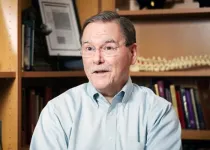(Press-News.org) New guidelines are needed to assure that research on human subjects performed on commercial spaceflights is conducted ethically, a panel of experts say in a commentary appearing in the September 28 issue of the journal Science.
Their paper is titled Ethically cleared to launch?
Private companies are expected to fly thousands of people into space in the coming decades. Those aboard will include workers and passengers who will have the opportunity to participate in research studies. Such research is not only essential to assure the safety of future space travelers but often also addresses critical issues of human health in general.
Buț current ethical rules used to govern research on human subjects do not directly address the unique circumstances of research aboard commercial spaceflights, according to a panel convened by Center for Medical Ethics and Health Policy, Baylor College of Medicine, Houston.
“There has been a long tradition of astronauts from NASA and other national space agencies of volunteering for research, and the agencies have established tradition on how this research is done,” said Dr. Michael A. Williams, professor of neurology and neurological surgery at the University of Washington School of Medicine in Seattle and one of the paper’s co-authors. “But how such research is going to be done aboard commercial flights, where incentives might be different, hasn’t really been explored.”
The panel calls for formulating guidelines based on four anchoring principles. The first of these is social responsibility. Commercial spaceflight is possible because of a substantial public investment, they argue, so research conducted on commercial spaceflights should benefit society at large.
Second, research conducted on commercial spaceflights should aim for scientific excellence.
“Poorly designed, duplicative, and low- priority studies beget poor-quality data. They cloud the evidence base, endanger participants, and waste resources,” they write.
Third, research aboard commercial spaceflights should adhere to the principle of “proportionality,” which holds the risk of research should be minimized “to the extent possible, and proportionately balanced in relation to the anticipated benefits of the individual commercial space flight participants and to society.”
And, finally, the guidelines should promote the principle of “global stewardship” that assures that the “benefits of human space exploration be enjoyed by all.”
The authors acknowledge that their guidelines emphasis on importance of social responsibility differs from other ethical guidelines that give primacy to the research subjects’ autonomy in deciding whether to participate in a study, but they argue so few individuals are selected for spaceflight that participation should be encouraged.
"All prospective commercial space flight participants should be fully informed about the social value of any proposed research protocols and be encouraged to participate,” they conclude. “Incentivizing participation may be justified, so long as the incentive is calibrated with the risks and does not create undue inducement. Commercial companies may give preference to those commercial space flight participants willing to participate in research, but further ethical attention is needed to determine whether commercial space flight participants should remain flight eligible even if they decline research participation.”
NASA’s practices may serve as a model, Williams said. “At NASA, for any given mission an individual might be eligible to participate in as many and 40 to 50 studies, but they get to pick and choose the ones they want to participate in. That respects the principle of autonomy.”
The lead author on the Science paper is Vasiliki Rahimzadeh and the senior and corresponding author is Amy L. McGuire, both of the The Center for Medical Ethics and Health Policy at Baylor.
END
Ethics rules needed for human research on commercial spaceflights, panel says
Social responsibility, scientific excellence, proportionality, and global stewardship should be guiding principles for guidelines
2023-09-28
ELSE PRESS RELEASES FROM THIS DATE:
A few essential genetic differences tailor flowers to bee or hummingbird pollinators
2023-09-28
Large differences in flower characteristics between wildflowers with different pollinators are achieved by a few key genetic differences, according to a study by Carolyn Wessinger at the University of South Carolina, US, and colleagues, publishing September 28th in the open access journal PLOS Biology.
Plants that rely on animal pollinators, such as insects or birds, have evolved distinctive suites of flower characteristics — known as “pollination syndromes” — that are tailored to the pollinator. For example, most plants in the ...
Dartmouth study removes human bias from debate over dinosaurs' demise
2023-09-28
To help resolve the scientific debate over whether it was a giant asteroid or volcanic eruptions that wiped out the dinosaurs and most other species 66 million years ago, Dartmouth researchers tried a new approach — they removed scientists from the debate and let the computers decide.
The researchers report in the journal Science a new modeling method powered by interconnected processors that can work through reams of geological and climate data without human input. They tasked nearly 130 processors with analyzing the fossil record in reverse to pinpoint the events and conditions that led to the Cretaceous–Paleogene (K–Pg) extinction event that ...
Cleared to launch? Ethical guidelines needed for human research in commercial spaceflight
2023-09-28
HOUSTON – (Sept. 28, 2023) – The commercial spaceflight industry is expanding opportunities for scientific research in space, but the industry needs clear ethical guidelines before human research is ready for liftoff. In a new policy paper published in Science, a global, multidisciplinary team of bioethicists, health policy experts, space health researchers, commercial spaceflight professionals and government regulators outlines potential ethical concerns facing the future of commercial space research and provides guiding principles ...
Genome-wide study of staghorn coral identifies genomic markers of disease resistance
2023-09-28
A genome-wide survey of highly endangered staghorn coral in the Caribbean has identified 10 genomic regions associated with resilience against white band disease – an emergent infectious disease responsible for killing up to 95% of Caribbean Acropora species, including staghorn corals (A. cervicornis). The findings could be used as a conservation tool to improve disease resistance in the wild and nursery stocks of staghorn corals used to repopulate damaged coral reefs throughout Caribbean waters. Over the last several decades, Earth’s reef corals have experienced unprecedented declines. Increased anthropogenic ...
Uncovered: the source of sticking power and virulence for an emerging fungal pathogen
2023-09-28
A previously uncharacterized adhesin protein specific to a human fungal pathogen first discovered in 2009 plays a crucial role in the fungus’s ability to colonize a variety of living and non-living surfaces, and in its virulence, according to a new study. “These findings [about Candida auris] offer insight into the genetics and molecular mechanisms by which [this fungus] mediates surface association, a trait critical to the increasing disease burden of this emerging pathogen,” write the authors. Since its first discovery in 2009, C. auris has become increasingly responsible for life-threatening infections in health care facilities worldwide. Outbreaks of ...
Science News Special Issue: Heat and Health
2023-09-28
From long-frozen and potentially dangerous pathogens awakening in Arctic permafrost to emerging heat-related hazards in human pregnancy, ongoing climate change presents new challenges for human health. In this Special Issue, Science’s News Department offers a collection of five news stories highlighting several facets of the complex intersection between heat, disease, and human health and the researchers seeking to understand related emerging threats.
In one Feature, Science Correspondent Kai Kupferschmidt discusses ...
Innovative approach reveals environmental mechanisms of the end-Cretaceous extinction
2023-09-28
A novel approach to a question that’s been widely investigated reveals more insights about the environmental forcings associated with the end-Cretaceous mass extinction, suggesting that volcanism and other biological changes imparted stress on the global carbon cycle across the Cretaceous/Paleogene (K/Pg) boundary. In addition to providing new insights into the factors that contributed to extinction, the approach could be useful in disentangling other complex perturbations in the Earth system and their associated climatic and biological impacts. The end-Cretaceous mass ...
Ethical guidelines needed before human research in commercial spaceflight is ready for liftoff
2023-09-28
A global, multidisciplinary team of bioethicists, health policy experts, commercial spaceflight professionals and space health researchers, including Rachael Seidler from the University of Florida, has developed guiding principles and best practices to help ensure human research conducted in space is safe and inclusive.
The proposed ethical guidelines were released Friday in a policy paper published in Science and are the result of a workshop held at the Banbury Center of Cold Spring Harbor Laboratory funded by the Translational ...
Van Andel Institute chief scientist earns $7.9 million Outstanding Investigator Award to support cancer research
2023-09-28
GRAND RAPIDS, Mich. (September 28, 2023) — Van Andel Institute Chief Scientific Officer Peter A. Jones, Ph.D., D.Sc. (hon), has received a seven-year, nearly $7.9 million grant from the National Cancer Institute’s Outstanding Investigator Award program. The funding will fuel his research into the epigenetic errors that drive cancer development — and help him find ways to fix them.
The award is a renewal of an earlier seven-year, $7.8 million Outstanding Investigator Award granted to Jones in 2017. The National Cancer Institute, a part of the National Institutes of Health, launched the Outstanding Investigator Award program in 2014 to support “investigators with ...
NUTRITION 2024 makes its way to Chicago
2023-09-28
Rockville, MD (September 28, 2023) – The American Society for Nutrition (ASN) announced today that its annual meeting, NUTRITION 2024, will take place in Chicago, Illinois, June 29 - July 2, 2024. NUTRITION 2024 is the premier meeting for the nutrition community, exploring developments in clinical and translational nutrition, food science and systems, diet and disease, basic science, global health, and more. Nutrition scientists are invited to share their research and join together with clinicians, policy experts, industry, and the media to network and learn for 3.5 exciting days in Chicago.
"I look forward to being together with the best in our field. From groundbreaking ...
LAST 30 PRESS RELEASES:
Mount Sinai, Uniformed Services University join forces to predict and prevent diseases before they start
Science of fitting in: Do best friends or popular peers shape teen behavior?
USF study: Gag grouper are overfished in the Gulf; this new tool could help
New study from Jeonbuk National University finds current climate pledges may miss Paris targets
Theoretical principles of band structure manipulation in strongly correlated insulators with spin and charge perturbations
A CNIC study shows that the heart can be protected during chemotherapy without reducing antitumor efficacy
Mayo Clinic study finds single dose of non-prescribed Adderall raises blood pressure and heart rate in healthy young adults
Engineered immune cells show promise against brain metastases in preclinical study
Improved EV battery technology will outmatch degradation from climate change
AI cancer tools risk “shortcut learning” rather than detecting true biology
Painless skin patch offers new way to monitor immune health
Children with poor oral health more often develop cardiovascular disease as adults
GLP-1 drugs associated with reduced need for emergency care for migraine
New knowledge on heritability paves the way for better treatment of people with chronic inflammatory bowel disease
Under the Lens: Microbiologists Nicola Holden and Gil Domingue weigh in on the raw milk debate
Science reveals why you can’t resist a snack – even when you’re full
Kidney cancer study finds belzutifan plus pembrolizumab post-surgery helps patients at high risk for relapse stay cancer-free longer
Alkali cation effects in electrochemical carbon dioxide reduction
Test platforms for charging wireless cars now fit on a bench
$3 million NIH grant funds national study of Medicare Advantage’s benefit expansion into social supports
Amplified Sciences achieves CAP accreditation for cutting-edge diagnostic lab
Fred Hutch announces 12 recipients of the annual Harold M. Weintraub Graduate Student Award
Native forest litter helps rebuild soil life in post-mining landscapes
Mountain soils in arid regions may emit more greenhouse gas as climate shifts, new study finds
Pairing biochar with other soil amendments could unlock stronger gains in soil health
Why do we get a skip in our step when we’re happy? Thank dopamine
UC Irvine scientists uncover cellular mechanism behind muscle repair
Platform to map living brain noninvasively takes next big step
Stress-testing the Cascadia Subduction Zone reveals variability that could impact how earthquakes spread
We may be underestimating the true carbon cost of northern wildfires
[Press-News.org] Ethics rules needed for human research on commercial spaceflights, panel saysSocial responsibility, scientific excellence, proportionality, and global stewardship should be guiding principles for guidelines


